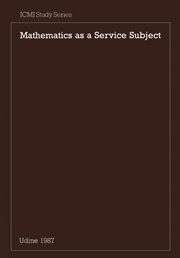Book contents
- Frontmatter
- Contents
- Foreword
- On the teaching of mathematics as a service subject
- What mathematics should be taught to students in physical sciences, engineering, …?
- Mathematics as a service subject – Why?
- Teaching first-year students
- Teaching mathematics to engineering students utilising innovative teaching methods
- Discrete mathematics: some personal thoughts
- Mathematical education for engineering students
- Some reflections about the teaching of mathematics in engineering schools
- Teaching mathematics as a service subject
- A Final Statement
- List of Participants
- Contents of Selected Papers on the Teaching of Mathematics as a Service Subject
On the teaching of mathematics as a service subject
Published online by Cambridge University Press: 26 April 2011
- Frontmatter
- Contents
- Foreword
- On the teaching of mathematics as a service subject
- What mathematics should be taught to students in physical sciences, engineering, …?
- Mathematics as a service subject – Why?
- Teaching first-year students
- Teaching mathematics to engineering students utilising innovative teaching methods
- Discrete mathematics: some personal thoughts
- Mathematical education for engineering students
- Some reflections about the teaching of mathematics in engineering schools
- Teaching mathematics as a service subject
- A Final Statement
- List of Participants
- Contents of Selected Papers on the Teaching of Mathematics as a Service Subject
Summary
La science est continuellement mouvante dans son bienfait. Tout remue en elle, tout change, tout fait peau neuve. Tout nie tout, tout détruit tout, tout crée tout, tout remplace tout. La colossale machine science ne se repose jamais; elle n'est jamais satisfaite. .… Cette agitation est superbe. La science est inquiète autour de l'homme; elle a ses raisons. La science fait dans le progrès le rôle d'utilité. Vénérons cette servante magnifique.
Victor Hugo, L'art et la science, in William Shakespeare (1864).
The title of the study may shock. Mathematics is the most ancient of the sciences. Why should it be in the service of others, or worse still, in the service of technical activities? In reducing mathematics to a service rôle, does one not belittle its contents, its image? Let us immediately state that in our view ‘mathematics as a service subject’ does not imply some inferior form of mathematics or mathematics limited to particular fields. We mean mathematics in its entirety, as a living science, able – as history has ceaselessly shown – to be utilised in, and to stimulate unforeseen applications in very varied domains. The teaching of mathematics to students of other disciplines must now be accepted as a fact, a social need and, also, a relatively new problematic issue. In this introduction we shall try to show the extent of the phenomenon, the social needs which it expresses, foreseeable developments and likely results in terms of choice of subject matter and teaching methods, and finally the size of the new problems which confront students and teachers alike.
- Type
- Chapter
- Information
- Mathematics as a Service Subject , pp. 1 - 19Publisher: Cambridge University PressPrint publication year: 1988
- 2
- Cited by

